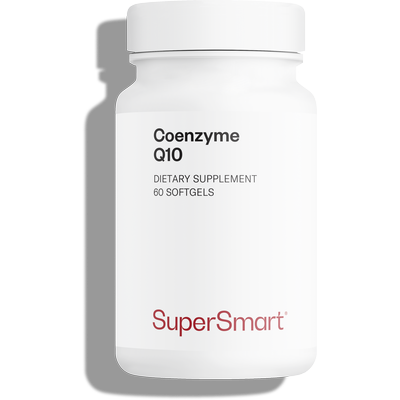This mitochondria-targeting antioxidant could take 20 years off your blood vessels
 A study published in Hypertension, the journal of the American Heart Association, has provided new evidence of this dietary supplement’s effectiveness for reducing the risk of cardiovascular disease. It also resurrects the value of oral antioxidants: though their efficacy has been challenged in recent years, these scientists have demonstrated just how beneficial these nutrients can be for our health, « “provided they are well-targeted”.
A study published in Hypertension, the journal of the American Heart Association, has provided new evidence of this dietary supplement’s effectiveness for reducing the risk of cardiovascular disease. It also resurrects the value of oral antioxidants: though their efficacy has been challenged in recent years, these scientists have demonstrated just how beneficial these nutrients can be for our health, « “provided they are well-targeted”.
The supplement in question is co-enzyme Q10. It’s a powerful antioxidant that plays a central role in the production of the cellular energy required for numerous physiological processes. Without this energy, we wouldn’t be able to breathe or indeed function. This production occurs in tiny powerhouses in our cells called mitochondria which are descendants of ancient bacteria. It takes place in almost all the body’s cells though its intensity varies depending on the region: energy-greedy organs such as the kidneys, liver and especially the heart contain many mitochondria and are thus major production sites. Significant levels of coenzyme Q10 are correspondingly found at these sites because it is both needed to activate energy production, and is responsible for minimising the escape of free radicals. These oxidative species can be very dangerous if they leave the mitochondria for other cellular or extracellular elements, or if they reach mitochondrial DNA.
These two essential properties are the reason the body prefers to make coenzyme Q10 itself rather than rely on exogenous dietary sources. Such dependency would pose a much greater risk to cell integrity, particularly in cells which are sites of intense activity such as those of the heart. In actual fact, we owe this ‘good sense’ to natural selection, but this evolutionary mechanism could not have imagined that the boundaries of human life expectancy would be pushed back so rapidly. The timescale involved, which is very short relative to the scale of human existence, has not been sufficiently long to allow humans to evolve with strong enough defences to reach the age of 90.
From the age of 30 onwards, the body is already showing signs of fatigue. Production of coenzyme Q10 slowly starts to diminish, speeding up until by the age of 80, it has fallen to negligible levels (1), especially in muscle tissue. With less than half the optimal amount of coenzyme Q10, people of this age therefore lack energy (which is why they often feel cold even in mild temperatures) and are easily overwhelmed by escaping free radicals. This exposes many of their organs to age-related health problems such as cardiovascular disease …
So why not take coenzyme Q10 supplements to compensate for this age-related loss of production?
It is precisely this question that researchers at the University of Colorado Boulder wanted to explore in their crossover clinical trial involving volunteers aged 60-79. For six weeks, half the subjects were given a coenzyme Q10 supplement and the other half a placebo. After a brief wash-out period, the researchers then switched the two groups for a further six weeks to better compare the effects of the supplement and placebo. The results were staggering: when the subjects were taking the coenzyme Q10, they saw a 42% rise in dilation of their arteries, making their blood vessels look more like those of someone 15-20 years younger. According to the researchers, an improvement of this scale would be associated with a 13% lower risk of cardiovascular disease and was due, at least in part, to a decrease in oxidative stress.
« This is the first clinical trial to assess the impact of a mitochondrial-specific antioxidant on vascular function in humans,” said lead author Matthew Rossman. In fact, regular supplementation with vitamins C and E, other recognised antioxidants, has not demonstrated such dramatic effects on the blood vessels as coenzyme Q10. Which rather goes to prove the theory that antioxidants do not all target the same thing … At the same time, these same authors had previously shown that another compound, nicotinamide riboside, was also able to reverse ageing of the arteries:.
How to supplement with co-enzyme Q10
Coenzyme Q10 is still classified as a dietary supplement rather than a medicine because it’s a natural molecule that cannot be patented. It is considered to be completely safe, even when taken long-term (2), because of its natural presence in the body. As absorption is better with a little fat, it should ideally be taken at mealtimes, or ensure you choose a lipid-based supplement (Coenzyme Q10 30mg).
Study at the centre of this article:
Matthew J. Rossman, Jessica R. Santos-Parker, Chelsea A.C. Steward, Nina Z. Bispham, Lauren M. Cuevas, Hannah L. Rosenberg, Kayla A. Woodward, Michel Chonchol, Rachel A. Gioscia-Ryan, Michael P. Murphy, Douglas R. Seals. Chronic Supplementation With a Mitochondrial Antioxidant (MitoQ) Improves Vascular Function in Healthy Older Adults. Hypertension, 2018; HYPERTENSIONAHA.117.10787 DOI: 10.1161/HYPERTENSIONAHA.117.10787
References
1. Kalen A, Appelkvist EL, Dallner G. Age-related changes in the lipid compositions of rat and human tissues. Lipids. 1989;24(7):579–84. Epub 1989/07/012. Hidaka T, Fujii K, et al. Biofactors. Safety assessment of coenzyme Q10 (CoQ10). 2008;32(1-4):199-208. Review.

Excellent supplement containing the important compound CoQ10, heart concentrations of which decline with age
www.supersmart.comAll rights reserved
Free
Thank you for visiting our site. Before you go
REGISTER WITHClub SuperSmart
of exclusive benefits:
- Free: our weekly science-based newsletter "Nutranews"
- Special offers for club members only

















